Labour unions have always been controversial. Just like everything in the world has its pros and cons, so do the unions.
For a better understanding, let me repeat what a labor union is? Labour unions are organized groups of workers gathered to make decisions about work.
Pros And Cons Of Unions – 8 Amazing Pros To Consider
Their purpose of unions is to bring economic justice to the workplace and social justice to the nation.
Let’s dig into this article to have a better insight into labor unions.
1. Unions Promote Higher Wages
By doing some collective bargaining, unions provide workers with higher wages and benefits.
Non-unionized workers also get benefited when employers increase wages to compete for employees.
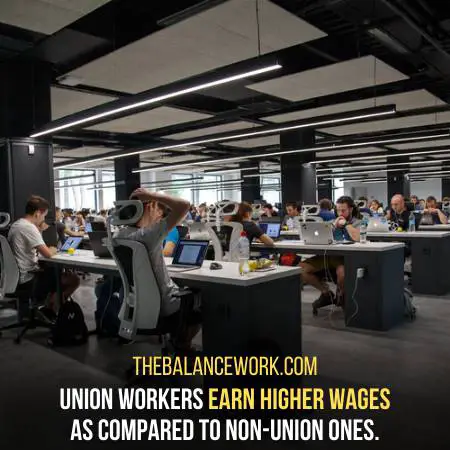
A study showed that unionized workers earn about 800 dollars per month extra. It’s far more than the non-unionized workers.
So union representation helps workers bring in more wages and benefits like pension.
2. Unions Help To Get Better Benefits – Pros And Cons Of Unions
Union workers get necessary benefits from the employer as compared to non-unionized.
One major pro is that union workers don’t have to share the benefits they are getting.
In comparison to non-union workers, unionized ones have better access to sick days. They get more vacation days.
3. It Protects Worker’s Right To Work
Most employers hire people with at-will contracts. It means that they can fire the workers at any time for any reason.
Even sometimes, they fire people for the things done outside the workplace.

Unions protect the rights of the worker and help them protect their jobs.
Unionized workers have increased job security and fair play. They have a better level of defense against disciplinary actions like warnings.
4. Unions Enhance Workers Power To Negotiate – Pros And Cons Of Unions
Workers get a better negotiating environment when they work through unions. If you are working without a union, you’d have to negotiate your salary independently.
So you see what benefits unions will give you. Unions are operating under a bargaining agreement. This agreement can get renegotiated after a certain period.
It allows the employees to renegotiate their salary better after a certain period.
5. Political Organizing Gets Easier By Unions
Unions direct worker’s energies into national organizations and collect money also.
By doing so, unions simplify to advance political causes supported by the workers.
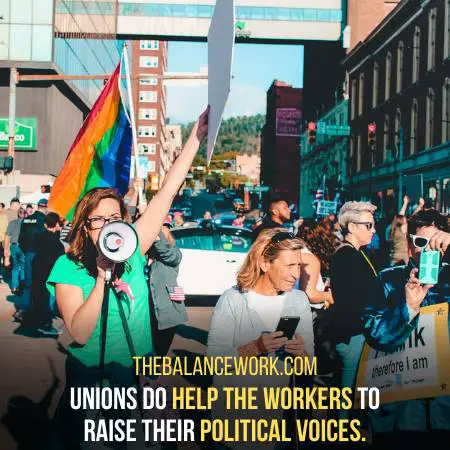
Unions vocalize the political voices of their workers. Not every member needs to support the cause of its union.
In general, unions keep the workers focused on issues like fewer manufacturing jobs.
If not supported by the union, such causes wouldn’t have a powerful political reason behind them.
6. It Sets Up Formal Procedures For Complaints And Disputes
Unions help the workers to deal with their disputes and complaints. Whether these disputes are within the workers or with the management, unions help.
There are formal processes helping the workers to raise grievances regardless of status.
Unions help the workers to file a complaint against their boss for termination.
7. Better Retirement Opportunities – Pros And Cons Of Unions
People who get represented by unions have better access to retirement benefits.
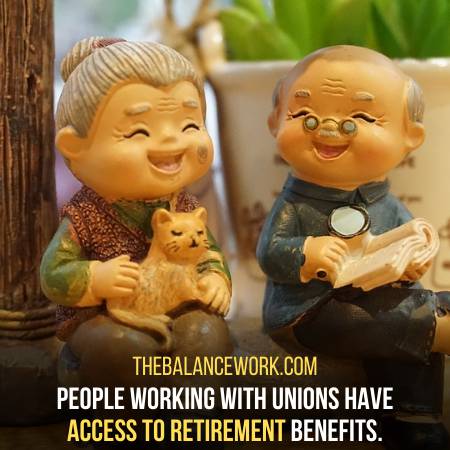
About 90% of unionized workers get these benefits at the end of their jobs. At the same time, only 64% of non-unionized workers get such benefits.
8. Unions Are Trend Setters
You must have seen the written slogans like “Movement that brought you the weekend.”
Things we take for guaranteed now, like weekends, got earned by unions after hard work.
Unionization spreads specific norms throughout the economy. These norms also benefit the non-unionized workers.
8 Undeniable Cons Of Unions
Here are some of the downsides of a labour union, and one should consider these.
1. They Do Not Provide Representation For Free
If you think that unions will help you free of cost, then you’re at a mistake.
Union expenses range from 200 dollars to several hundred dollars every year. That’s a big part of the worker’s paycheck.
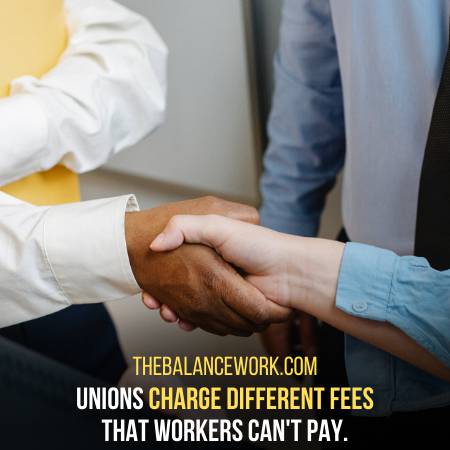
However, not all workers get required to pay, but those are specific circumstances.
To get the benefits of a union’s representation, workers have to pay a part of their salaries.
The representation fee is more than 2.5% of the salary for some unions.
Yearly fee, apprenticeship fee, initiation fee are some other expenses. These all add up to a significant amount of money. And not all workers can pay this amount.
2. It Discourages You Individually – Pros And Cons Of Unions
When you work in a group, you get dragged towards “group think”, which lowers individual creativity.
Often, a worker disagrees with a decision but has to support it anyway because of the group.
It supports the “go with the flow” protocol and disables the worker’s thinking.
That’s all because unions decide based on majority votes and not on an individual’s ideas.
3. They Set Workers Against The Company
Unions help the workers to raise voice for common goals, it also negatively affects them.
When workers speak up for a wage rise or security, unions pit them against the company.
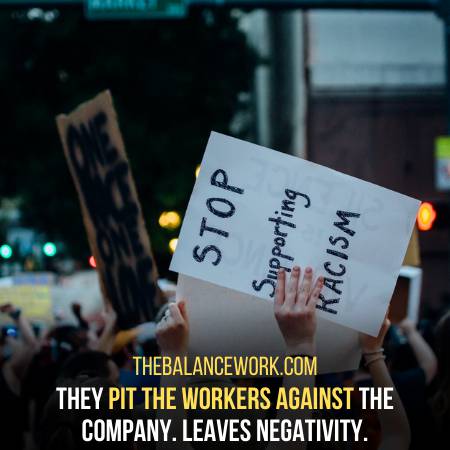
It hurts the culture of the company they’re working for. It also causes unsolvable conflicts between management and workers.
4. Unions Causes Businesses To Increase Prices
When a business pays higher wages to union workers, they charge higher from consumers.
It also leads the taxpayers to foot the bills in the long run. And that’s a significant disadvantage for both the businesses and consumers.
Businesses start to lose their customers if they are charging too high. It can be a difficult situation for the economy.
5. Discrimination Exists – Pros And Cons Of Unions
Instead of education and experience, unions put an influence on seniority. That’s because unions work on the principle of favoritism and internal leadership.

A person in a better position has a higher chance of getting a promotion. At the same time, the people on merit couldn’t get the chance.
It hinders the growth of skilled people. Also, when the company is doing layoffs, the most junior person has to go no matter what.
6. It’s Harder To Promote And Terminate Workers Because Of Unions
As said above, unions promote discrimination, so the focus is on the seniority of the worker.
So the new and high-performing employees don’t get a chance to advance in their careers.
In the same manner, it’s not easy to terminate senior employees even if they aren’t doing good.
Unions don’t count on worker’s education and experience. And that’s why skilled people are unable to get a job.
7. Bad Relationship Between Workers And Management
Unions gather the workers to negotiate with management. It also worsens the situation and leads to hostilities between labor and management.

This negative relationship can cause troubles for the worker in the future. It also leaves a negative impact on the whole organization.
8. Union Decisions Doesn’t Always Benefit Everyone – Pros And Cons Of Unions
Unions advocate for changes in the workplace that aren’t favorable for everyone.
Unions advocate for benefits over others that aren’t a priority for some workers. They might have wanted different changes.
This mess is because unions work on the majority’s opinions and not individual preferences.
Frequently Asked Questions
Why Should You Not Join A Union?
Unions demand higher wages, and employers have to cut staff to meet this criterion. Also, unions work for job security based on seniority. It means a competent individual can get laid off while a non-competent person stays.
Are Unions Growing Or Declining?
For private-sector workers, the unionization rate increased by 0.1 to 6.3 percent. It represents the real effect of the decline in the number of union members in the private sector. It also leads to a steep drop in private sector employment.
Can I Refuse To Pay Union Dues?
In the United States, no one is legally required to pay the full dues. If you can’t pay the dues, you can resign from the membership. If you don’t want to pay the full dues, notify the union. It will limit the fee to the union’s proven costs.
Is Joining A Union A Good Idea?
If you join a union, you’ll be able to get better wages in comparison to non-union workers. Unions help the workers to negotiate for better working conditions and other benefits.
Conclusion
Generalizing the pros and cons of unions is tricky because there are different unions. The unions were male and white before, but its face is changing now.
Although union membership faced a decline, there’s again a peak in interest for unions.
The described pros and cons aren’t here for leaving either positive or negative impact on unions.
What matters the most is the company’s culture should be mature enough for a unionized workforce.
You are free to take your decision to join a union or not.
Feel free to share your experience in the comment section below.
Last Updated on 1 month by Aleena
- 7 Jobs For People With Cerebral Palsy – Tips To Manage Yourself - October 6, 2022
- 15 Easy-On-Hand Jobs For People With Chronic Fatigue In 2022 - October 2, 2022
- 9 Effortless Jobs For People With Agoraphobia - October 1, 2022
